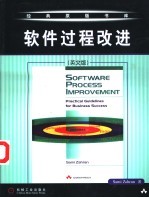图书介绍
软件过程改进 英版PDF|Epub|txt|kindle电子书版本网盘下载

- 扎罕(Zahran,S.)著 著
- 出版社: 北京:机械工业出版社
- ISBN:711111809X
- 出版时间:2003
- 标注页数:447页
- 文件大小:46MB
- 文件页数:477页
- 主题词:软件开发-英文
PDF下载
下载说明
软件过程改进 英版PDF格式电子书版下载
下载的文件为RAR压缩包。需要使用解压软件进行解压得到PDF格式图书。建议使用BT下载工具Free Download Manager进行下载,简称FDM(免费,没有广告,支持多平台)。本站资源全部打包为BT种子。所以需要使用专业的BT下载软件进行下载。如BitComet qBittorrent uTorrent等BT下载工具。迅雷目前由于本站不是热门资源。不推荐使用!后期资源热门了。安装了迅雷也可以迅雷进行下载!
(文件页数 要大于 标注页数,上中下等多册电子书除外)
注意:本站所有压缩包均有解压码: 点击下载压缩包解压工具
图书目录
PART 1:PROCESS THINKING1
1 PROCESS THINKING3
1.1 What is process thinking?3
1.2 What is a process?5
1.3 Process focus7
1.4 Process maturity9
Summary13
2 PROCESS DISCIP LINE17
2.1 Process discipline17
2.2 Benefits of process discipline20
2.3 Process discipline and product quality24
2.4 Process-focused organizations27
Summary33
3 EFFECTIVE PROCESS ENVIRONMENT35
3.1 Process myths and realities35
3.2 What is an effective process?37
3.3 Mechanisms for making the process effective40
3.4 Process culture45
Summary48
4 PROCESS MATURITY:THE SECOND WAVE OF THE SOFTWARE INDUSTRY51
4.1 Waves and megatrends of the software industry51
4.2 The software process maturity movement53
4.3 Levels of software process institutionalization56
4.4 Software process maturity standards and initiatives58
Summary62
PART 2:A FRAMEWORK FOR SOFTWARE PROCESS IMPROVEMENT65
5 A FRAMEWORK FOR SOFTWARE PROCESS IMPROVEMENT67
5.1 Software process improvement environment67
5.2 Software process infrastructure70
5.3 Software process improvement roadmap74
5.4 Software process assessment76
5.5 Software process improvement plan78
Summary80
6.1 Justification and definition83
6 SOFTWARE PROCESS INFRASTRUCTURE83
6.2 Organizational and management infrastructure89
6.3 Process technical infrastructure105
6.4 An example of a software process support infrastructure118
6.5 Making the infrastructure effective121
Summary125
7 PROCESS IMPROVEMENT ROADMAPS129
7.1 Learning from the quality gurus129
7.2 Software process improvement models134
7.3 Staged versus continuous architecture for SPI models137
Summary143
8 FUNDAMENTALS OF SOFTWARE PROCESS ASSESSMENT145
8.1 Definitions of assessment145
8.3 Assessment domains154
8.4 Assessment generic phases157
8.5 Mapping assessment approaches to the generic cycle160
Summary163
9.1 Creating a software process improvement action plan165
9 SOFTWARE PROCESS IMPROVEMENT ACTION PLAN165
9.2 Allocating resPonsibilities for implementing SPI actions173
9.3 Guidance for Action Planning(GAP)-an example of an action planning method177
Summary179
PART 3:MAKING SOFTWARE PROCESS IMPROVEMENT HAPPEN181
10 LAUNCHING SOFTWARE PROCESS IMPROVEMENT183
10.1 Stages for making software Process improvement happen183
10.2 Launching software process improvement184
10.3 Adopting a software process improvement model190
10.4 Humphrey's process change requirements192
10.5 Ingredients for successful software process improvement194
Summary197
11 IMPLEMENTING AND INSTITUTIONALIZING SOFTWARE PROCESS IMPROVEMENT199
11.1 Implementation and institutionalization phases199
11.2 Principles for implementing and institutionalizing SPI200
11.3 Implementing SPI actions and managing the change202
11.4 Institutionalizing software process improvement211
11.5 The SEI IDEAL model-an example of an SPI implementation model215
Summary219
12 MEASURING THE BENEFITS OF SOFTWARE PROCESS IMPROVEMENT221
12.1 Measuring software process perfromance221
12.2 Principles of software process measurement223
12.3 Issues with software process measurement226
12.4 An example of a software process measurement method226
Summary232
PART 4:CURRENT MODELS AND STANDARDS FOR SOFTWARE PROCESS IMPROVEMENT233
13 THE CAPABILITY MATURITY MODEL(CMM)235
13.1 Overview of the Capability Maturity Model235
13.2 Maturity levels of the CMM239
13.3 Internal structure of the CMM247
13.4 Uses of the CMM256
13.5 CMM Version 2.0261
Summary262
14.1 CMM-based appraisals265
14 CMM-BASED SOFTWARE PROCESS ASSESSMENT265
14.2 The SEI maturity questionnaire266
14.3 The SEI-assisted assessment process270
14.4 SEI software capability evaluation(SCE)276
Summary280
15 ISO/IEC 15504 DRAFT TECHNICAL REPORT FOR SOFTWARE PROCESS ASSESSMENT283
15.1 Introduction283
15.2 Architecture of the ISO/IEC 15504 technical report285
15.3 ISO/IEC 15504 process categories290
15.4 ISO/IEC 15504 capability levels304
15.5 ISO/IEC 15504 capability measurements308
15.6 Relationship of ISO/IEC 15504 to other international standards309
Summary311
16 ISO/IEC 15504 DRAFTGUIDE TO CONDUCTING ASSESSMENT313
16.1 Overview313
16.2 Assessment planning315
16.3 Fact gathering322
16.4 Fact analysis324
16.5 Presenting the assessment output329
16.6 ISO/IEC 15504 guidance on assessment instruments331
16.7 Using ISO/IEC 15504 guidance for conducting assessments335
Summary337
17 BOOTSTRAP SOFTWARE PROCESS ASSESSMENT339
17.1 Motivation and background339
17.2 BOOTSTRAP process model340
17.3 Capability scale and assessment instruments343
17.4 The BOOTSTRAP assessment process347
17.5 BOOTSTRAP and other initiatives354
Summary355
18 OTHER INITIATIVES357
18.1 ISO 9000 quality standards357
18.2 ISO/IEC 12207,'Software Life Cycle Processes'364
18.3 DoD standard MIL-STD-498365
18.4 Trillium368
18.5 The V-Model377
Summary385
PART 5:BUSINESS BENEFITS OF SOFTWARE PROCESS IMPROVEMENT387
19 THE EVIDENCE:BUSINESS BENEFITS OF SOFTWARE PROCESS IMPROVEMENT389
19.1 Relating SPI benefits to the business389
19.2 Evidence from Europe390
19.3 Evidence from the USA399
19.4 Lessons learned406
Summary407
20 EPILOGUE:FUTURE OF SOFTWARE PROCESS IMPROVEMENT409
20.1 Process maturity:is it another buzzword?409
20.2 Role of international standards409
20.3 Process discipline is a prerequisite for software industrialization410
20.4 What next?410
GLOSSARY411
REFERENCES437
INDEX443